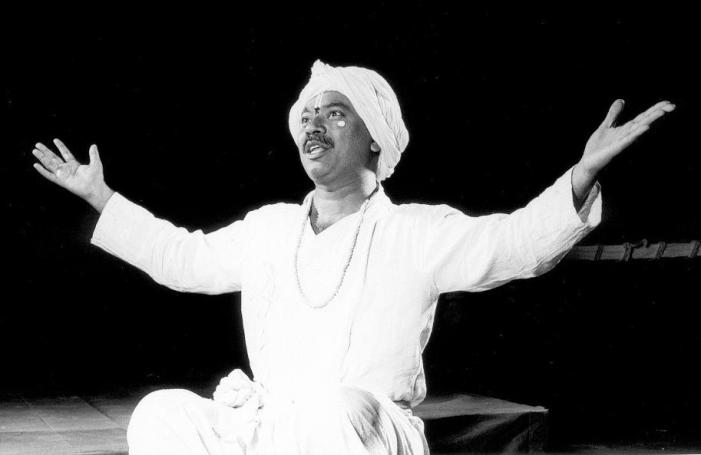| |
|
| |
| |
Review |
|
|
Shanta Gokhale |
| |
|
Vaze
College in Mulund has a small, well-appointed
auditorium, perfect for an intimate performance.
Its acoustics are so good that every clap in a
shower of applause is heard separately as a
crystal clear drop of sound. The applause at the
end of “Anandovari” shone with that kind of
liquid brightness.
“Anandovari” is a one-man presentation of D B
Mokashi’s 1974 novella of the same name, edited
for the stage by Vijay Tendulkar. Atul Pethe,
the director, is serious about theatre because
he’s serious about life.
His
work over the last decade has arisen out of his
deep frustration with the hypocrisy, corruption,
cynicism and pretensions that have got hold of
our private and public life. His actor Kishor
Kadam too is serious about theatre. Both have
made professional choices that reflect their
personal convictions. Since money comes only to
those who choose to serve the market, their
theatre suffers from an absence of funds. Pethe
overcomes this by clever management of
resources, helped by a music composer and set
and light designers who use the very paucity of
means to create rich effects. |
 |
|
Kishor
Kadam |
|
“Anandovari” is an extended monologue spoken by
Kanha (Kishor Kadam), the younger brother of
Sant Tukaram. Tukaram has disappeared from home
yet again in search of his god, Vitthal. The
distraught Kanha forsakes family, fields and
business to look for his lost brother.
In
the course of the search, he addresses Tukaram,
reminding him of their shared boyhood and
adolescence. He speaks of Tukaram’s early
worldliness, the power and magic of his poetry,
the heavy burden that devotion to Vitthal has
placed on their entire family.
He
confesses that he himself has felt the danger of
this bhakti but pulled out before he drowned. He
chides Tukaram for abdicating his duty as a
householder and head of the family in favour of
a personal search for his god. As it happens,
this is the last time Kanha will go in search of
his brother, for on the third day he finds
Tukaram’s rug and pair of cymbals in a ditch
between two rocks on the banks of his beloved
river Indrayani. That’s it.
Tukaram has disappeared forever, nobody knows
where or how. The play begins and ends with the
rug lying in a spotlit heap at right of stage.
When we see it first, we don’t know what it is.
When we see it at the end, it has become a
potent symbol of worldy tragedy and spiritual
bliss!
That
Atul Pethe should choose to do this play today
is significant in a way that’s not immediately
obvious. But we begin to see its contemporary
relevance when we remember that Vitthal is not a
fair-skinned god. He is the deity of the common
man.
His
devotees, the Warkaris, refer to him as “maulee”
— mother. They have rejected caste and class
divisions. They are all equal before him. No
amount of mischievous interpretation can ever
distort Vitthal into an armed warrior who can be
pressed into the service of divisionists.
Tukaram himself was a shudra, harassed and
socially ostracised by the brahmins of his
village, Dehu, for daring to write devotional
verses at all, and for compounding his sin by
writing them in Marathi when Sanskrit, available
only to brahmins, was the language of the gods.
The
bhakti marg was anathema to brahmins because it
made their mediation with the gods redundant. It
gave people the right to speak directly to their
god without the help of elaborate rituals,
presided over by priests.
Tukaram’s abhangs have permeated the very
language and being of Maharashtra. Vitthal’s
devotees know they cannot be scared into
violence by upstarts pretending to represent
their religion. In doing “Anandovari” today,
pehaps Atul Pethe is reminding us of this. |
| |
| |
Courtesy
: Mid-day December 31, 2002 |
|
|
| |
|
|
|